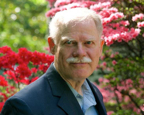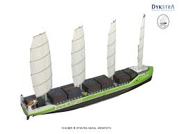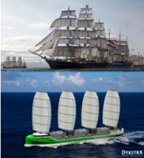Home
|
by Richard Adrian Reese
|
 In 1968, biologist Paul Ehrlich achieved infamy by publishing The Population Bomb, one of the most controversial eco-books ever printed. Ehrlich has been condemned to spend eternity with Thomas Malthus, in a dungeon reserved for doom perverts. To this day, professors still use the two lads as great reasons to never take seriously anyone who asserts that there are limits to growth. We all know, of course, that humankind has no limits. We have technology! In 1968, biologist Paul Ehrlich achieved infamy by publishing The Population Bomb, one of the most controversial eco-books ever printed. Ehrlich has been condemned to spend eternity with Thomas Malthus, in a dungeon reserved for doom perverts. To this day, professors still use the two lads as great reasons to never take seriously anyone who asserts that there are limits to growth. We all know, of course, that humankind has no limits. We have technology! |
|
|
by Abbie Kouzmanoff
|
 "Violent campaigns are more than twice as likely to fail in their objectives as nonviolent ones. Violence is becoming increasingly ineffective, and nonviolence is becoming increasingly effective over time... Civil resistance can be an effective force for change in the world in almost any context." As to post-campaign outcomes, violence tends to stay around: "Win by the sword, rule by the sword." - Prof. Erica Chenoweth "Violent campaigns are more than twice as likely to fail in their objectives as nonviolent ones. Violence is becoming increasingly ineffective, and nonviolence is becoming increasingly effective over time... Civil resistance can be an effective force for change in the world in almost any context." As to post-campaign outcomes, violence tends to stay around: "Win by the sword, rule by the sword." - Prof. Erica Chenoweth
From The Dartmouth Staff: Professor Presents Empirical Support for Nonviolence
The notion that violent insurgency can effectively enact change around the world is a myth, according to Erica Chenoweth. |
|
|
by Paul Glover
|
 Americans have the tools and money to create an America where all workers are employed, whose every square mile is beautiful; whose cities are safe playgrounds for children; whose food is fresh and affordable; whose waters are clean from sea to crystal sea. An America run by Americans for Americans is fully capable of rebuilding all homes so they're earthquake-proof, hurricane-proof, tornado-proof, flood-proof, drought-proof, fireproof, and bank-proof. When Americans take control of money, we are wealthy enough to build an America where it's easy to stay healthy and to get healed; where costs of living get smaller and our lives get bigger.
Americans have the tools and money to create an America where all workers are employed, whose every square mile is beautiful; whose cities are safe playgrounds for children; whose food is fresh and affordable; whose waters are clean from sea to crystal sea. An America run by Americans for Americans is fully capable of rebuilding all homes so they're earthquake-proof, hurricane-proof, tornado-proof, flood-proof, drought-proof, fireproof, and bank-proof. When Americans take control of money, we are wealthy enough to build an America where it's easy to stay healthy and to get healed; where costs of living get smaller and our lives get bigger. |
|
|
by Jan Lundberg
|
|
Community resilience will be as important as personal health and natural immunity for preventing the worst Ebola scenarios or similar calamities. It is safe to count on some resilience in the face of Ebola, but this will ultimately be despite our vaunted technological prowess which, if enough damage has already resulted and ominous trends hold, has served overall to weaken our species. Ebola is certainly a wild card with death's face, but a disease-threat can also be mainly a symptom -- a symptom of our mistakes in the dominant culture, led by globalization for an unprecedented number of technologically dependent, overcrowded humans.
Introduction: Energy-industry infrastructure analysis as the origin of this exploration
|
|
|
by Jan Lundberg
|
|
For whatever its accomplishments and intricacies, Western Civilization has been based on (1) the exploitation of people and the environment, and (2) the attempt of constant expansion -- geographically, quantitatively, and in the mind.
This expression has had such a long run that it has comprised all conventional history. All the while, civilization as top-down exploitation and expansion has been ratcheting up spectacularly, especially in recent decades, despite -- and partly because of -- fast-shrinking resource limits. Climate instability is barely beginning to act as a brake.
The relatively slow process of civilization's march via exploitation and expansion has finally graduated and adapted to something unanticipated little over a century ago: mass consumption.
|
|
|
by Jan Lundberg
|
|
The U.S. holiday Labor Day is a joke. Any day off is welcome, of course. However, again there will be no visible strikes and no muscle-flexing by the labor movement. Observance of Labor Day is as if having to be either over-worked or unemployed, putting up with extreme income disparity, tolerating insanely onerous student debt, forced to contribute to environmental degradation and unabated military madness, are non-existent issues in the "real world."
The non-labor orientation of our political reality has a lot to do with the loss of May Day (May 1st) in the U.S. as a workers' show of force and rallying tool. This is ironic when the world picked up on it big time, honoring it to this day, almost a century and a half after the U.S. anarchist labor movement created it. |
|
|
by Jan Lundberg
|
From New York City and the region's young farmer movement:
 Hear the half-hour show now at heritageradionetwork.org Greenhorns Radio, Episode 197, guest Jan Lundberg. Host: Severine Fleming, Director of Greenhorns.
Hear the half-hour show now at heritageradionetwork.org Greenhorns Radio, Episode 197, guest Jan Lundberg. Host: Severine Fleming, Director of Greenhorns.
Background for Sail Transport Network readers: Greenhorns partnered with the Vermont Sail Freight Project when it made its historic voyage down the Hudson River bringing food cargo last year. |
|
|
by SAIL MED
|
 In the fall of 2013, a dedicated group from Greece, the Netherlands and the U.S.A. formed a consortium - SAIL MED - to promote clean, renewable-energy transport (by sail) in the Mediterranean Sea region. With the EU-funded North Sea consortium "SAIL" now completing its mission to design a 150-meter Ecoliner, SAIL MED aims to further promote hybrid-sail cargo vessels for southern Europe.
In the fall of 2013, a dedicated group from Greece, the Netherlands and the U.S.A. formed a consortium - SAIL MED - to promote clean, renewable-energy transport (by sail) in the Mediterranean Sea region. With the EU-funded North Sea consortium "SAIL" now completing its mission to design a 150-meter Ecoliner, SAIL MED aims to further promote hybrid-sail cargo vessels for southern Europe.
|
|
|
by Adam Barney
|
|
Adam Barney's report from the front lines of drug rehabilitation, Florida Beach Rehab, takes a national policy view of main aspects of substance abuse. Culture Change's editorial commentary on healing and on hemp follows this post. - ed.
Uruguay made a groundbreaking legislative change in 2013 when the nation legalized the growth, sale, and consumption of marijuana all at once. That monumental change appears to have accelerated the legalization of the plant across parts of the U.S., which has subsequently reduced much of the stigma attached to marijuana. |
|
|
by Jan Lundberg
|
 Everyone knows this is the next development in shipping, but who will take the lead? This is the feeling shared amongst everyone in on the movement, especially during and after the recent Harlingen, Holland meeting of organizations and activists interested in the Ecoliner -- a hybrid sailing ship designed for timely delivery of cargo with minimized pollution. Attendees were inspired by 65 tall ships gathered in Harlingen for a race and public outreach extravaganza.
Everyone knows this is the next development in shipping, but who will take the lead? This is the feeling shared amongst everyone in on the movement, especially during and after the recent Harlingen, Holland meeting of organizations and activists interested in the Ecoliner -- a hybrid sailing ship designed for timely delivery of cargo with minimized pollution. Attendees were inspired by 65 tall ships gathered in Harlingen for a race and public outreach extravaganza.
|
|
|
by Jan Lundberg
|
 July 4th this year means something different to me than if I had stayed in the U.S. I'm honored to be asked to visit the small but brave, Frisian harbor town of Harlingen which is about to present the Tall Ships Race of 2014. The photo below says it all.
July 4th this year means something different to me than if I had stayed in the U.S. I'm honored to be asked to visit the small but brave, Frisian harbor town of Harlingen which is about to present the Tall Ships Race of 2014. The photo below says it all.
The foundation Harlingen Sail, the municipality of Harlingen and the province of Fryslân are hosting the race that involves several nearby countries. A feast for the eyes, it is also a training opportunity for many young sailors.
|
|
|
by Simon Ross, Population Matters
|
 Having a small family is the most important individual contribution we can make to a sustainable future Having a small family is the most important individual contribution we can make to a sustainable future
Human population growth is a major driver of unsustainable consumption levels. Like any issue, it has its pessimists and optimists. Pessimists point to the doubling of human numbers over the last half century and the projected addition of a further 50% or some 3.5 billion by the end of the century. Optimists point to the fall in the birth rate by one third over the last fifty years and that over half of the world’s citizens now live in countries at or below fertility replacement rate. |
|
| << Start < Prev 1 . 2 . 3 . 4 . 5 . 6 . 7 . 8 . 9 . 10 . Next > End >>
|
|
|
|

